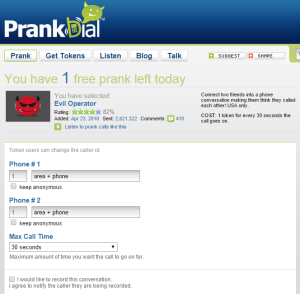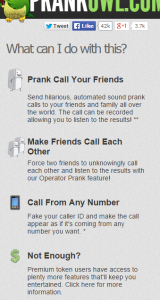Just as employees, secretaries, and anyone handling confidential information need to be aware of phishing and spoof email scams, they should also be attentive to any phone calls that come through odd or suspicious circumstances.
Kirk Eady, a Hudson County Corrections deputy director, is on trial in Newark federal court for allegedly eavesdropping on the phone conversations on corrections union leaders. He made use of a website service that allowed recording of phone calls.

Prankdial.com’s Evil Operator service no longer appears to be available. Screen shot from www.archive.org
Prankdial.com offered a service they called “evil operator” where you could enter two telephone numbers and they would call each other, then you could listen in to the conversation. Prank Dial no longer appears to have this service on their site, but other prank websites offer something similar.
“This was no prank call, this was the defendant’s way of gaining information about his perceived enemies, people he strongly disliked, in order to harass them, retaliate against them,” Assistant U.S. Attorney Amy Luria said in her opening statement.
Eady claims his innocence by blaming the web site Prankdial’s service. His defense attorney Peter Willis claimed, “Kirk Eady never recorded anyone’s conversation, Evil Operator recorded the conversations.”
Eady accessed the Evil Operator feature on the website at least 12 times, the complaint states. Several times, the numbers came back to three jail employees who were also members of the PBA. A fourth number belonged to an individual who had posted “online articles” critical of Eady’s work as deputy director, according to the complaint.
In June 2012, an unidentified person told an FBI agent that Eady admitted taping the phone calls and proved it by playing one of the conversations on his cell phone. Eady admitted to the individual that he recorded the conversation because he “wanted to obtain private information about the PBA,” the complaint states.
Federal investigators turned the tables on Eady in 2012 by recording conversations he had with the cooperating witness — referred to in court papers as CW1. In those conversations, Eady admitted he knew how to make two telephone numbers call one another so he could record the conversation, the complaint filed by FBI Special Agent Linwood Bridgeforth states.
“He further admitted to CW1 that when the two numbers called each other, each telephone number would appear on the other person’s Caller ID so that it would look like they called each other, but it would really be Eady who initiated the telephone call,” the complaint adds.
Red flag: if you did not initiate the phone call, be sure the other person did, before discussing any confidential information.

